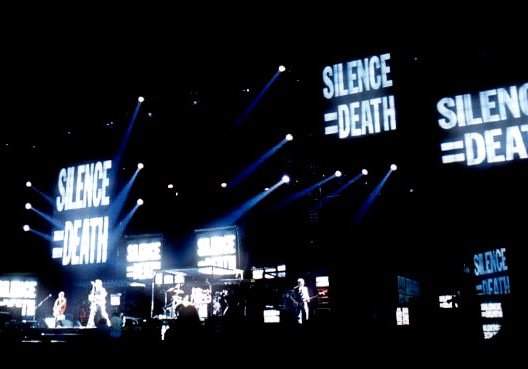As the rest of the music world chooses to heave a collective middle finger at U2 over the release of their latest record, Songs of Innocence, I decided to engage with a record of theirs that I really care about and to also, in some ways, come to terms with the fact that a band I really like pretty much sucks now. 1993’s Zooropa is worth revisiting because it serves as the last time U2 delivered a consistently good record before they devolved into the earnest, boring stadium rockers they’ve become over the course of the 2000s.
Released after the game-changing Achtung Baby, Zooropa finds U2 further embracing electronics, hip-hop, and industrial music. It’s arguably much more daring than its predecessor, because when listened to today, Achtung Baby sounds a lot like your standard U2 album, albeit with programmed beats and spacey guitar textures. Where that album and the resulting ZooTV tour took on media overload mixed with post-Wall European culture, Zooropa encapsulates the feelings of hope and anxiety that accompanied the reunification of Germany and the beginnings of the Internet Age. “And I have no religion, and I don’t know what’s what, and I don’t know the limit, the limit of what we’ve got,” Bono sings on the title track, echoing the theme of identity and place present throughout this album and a good portion of their work. The way it’s expressed here feels more in-the-moment and intimate than the wide-reaching, give-me-a-hug vibe present in so many of their hits (“Beautiful Day,” “Where the Streets Have No Name,” etc.). That feeling carries over into “Babyface,” and by the time you reach “Numb” (where the Edge gets the chance to “rap”), you start to absorb that information-overload theme that permeated so much of their work in the 90s.
The highlight of the album — and in my opinion, one of U2’s best songs — is “Lemon,” a low-key, synth-driven tune that features one of Bono’s strongest vocal performances. Apparently inspired by seeing old home movies of his mother, the song tackles our reliance on technology to relive and hold on to the past. “Man makes a picture,” the Edge sings in the closest thing to a chorus, “man captures color, man likes to stare, and turns his money into light to look for her.” This track always gives me goosebumps, even after hearing it dozens of times.
The rest of the album balances personal lyrics (drugs, love, death, and faith) and broader themes (politics, our relationship to technology). If you listen to the whole album (which you can do here), there’s a coherence to the many styles they draw from (techno, Krautrock, blue-eyed soul) that makes this one of their last enjoyable records from start to finish. Lyrically, they were way ahead of their time, as it took about 20 years for information overload and impersonal digital communication to become common talking points.
While 1997’s Pop and 2001’s All That You Can’t Leave Behind had their moments, Zooropa was the last time that U2 justified their status as ostensibly the most popular band in the world. From then on, it became more about U2 the brand rather than U2 the band. It’s ironic, then, that an album all about technology’s ability to dissociate us from the real world has become their final great statement.
More about: U2

